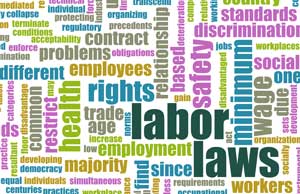 The current case of McHugh v NCH Scotland 2006, concerned an allegation of incapacity discrimination. Employment law is the gathering of legal guidelines and rules that regulate relationships between employers and workers. Employment laws say when an employer can hire employees and when the workers can work. The legal guidelines cover what an employer must pay the employee for his or her work. They create minimum necessities for working circumstances for employees.
The current case of McHugh v NCH Scotland 2006, concerned an allegation of incapacity discrimination. Employment law is the gathering of legal guidelines and rules that regulate relationships between employers and workers. Employment laws say when an employer can hire employees and when the workers can work. The legal guidelines cover what an employer must pay the employee for his or her work. They create minimum necessities for working circumstances for employees.
The British industrial revolution led to the introduction of employment laws in Britain. The reason for this was that, because of the introduction of industrialism and use of equipment for the primary time, staff were more and more being asked to work longer and longer hours. The average working day, prior to the revolution was between 11-14 hours, nevertheless this had risen, with some staff working as many as 16 hours a day.
The tribunal held that she had been unfairly dismissed resulting from the truth that the employer’s lengthy grievance process had numerous serious flaws which meant that the employer had behaved in a way which irreparably damaged the relationship of mutual belief and confidence between it and the employee. The worker’s discrimination declare was upheld on the grounds that the remedy she had received from her colleagues had been detrimental and that there was a distinction between the remedy which she had acquired and the treatment obtained by R. The employer then appealed.
The US has related protections in place, however they’re much less sweeping. The US’s Employee Adjustment and Retraining Notification Act (WARN) covers (usually) employers with one hundred or more staff. WARN requires most US employers with a hundred or extra employees to offer notification 60 calendar days prematurely of plant closings and mass layoffs. Some US states have similar legal guidelines that require employers to take extra steps in the occasion of layoffs.
For attorneys who enjoy regulation and compliance, employment law is an effective choice. Employment lawyers do not often see a courtroom. While employment disputes can go to trial, the vast majority of an employment lawyer’s duties involve advising employers in best practices and negotiating contracts. Employment legal professionals would possibly occasionally work to resolve employment disputes or negotiate bargaining agreements. Contested hearings are potential, however they’re sometimes an rare part of an employment lawyer’s duties.